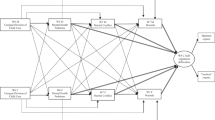Abstract
The aim of the study was to investigate the impact of disabled children on their fathers. Perceptions of family climate, sense of coherence, and satisfaction from family life were measured among 66 fathers of disabled children and among 74 fathers with nondisabled children in an Israeli kibbutz. The fathers of disabled children showed lower sense of coherence, derived less satisfaction from family life, and viewed their families as less encouraging of personal growth among family members. Four subtypes of family climate patterns, perceived by fathers of disabled children, were identified by cluster analysis and validated by the sense of coherence and global family satisfaction measures. Cluster analysis for the fathers of nondisabled children replicated the subtypes identified. The four subtypes were conceptualized as families with a (a) personal growth orientation, (b) conflict orientation, (c) conflict avoidance orientation, and (d) recreation avoidance orientation. Significant differences were found between the subtypes with regard to the family climate variables and satisfaction and coherence measures. Results demonstrated that different patterns of family climate characterized the two groups of fathers: In almost every cluster the measures of personal growth were lower for the fathers of disabled children.
Similar content being viewed by others
References
Antonovsky, A. (1979).Health, stress, and coping. San Francisco: Jossey-Bass.
Antonovsky, A. (1987).Unraveling the mystery of health. San Francisco: Jossey-Bass.
Baker, B., Sullaway, M., & Clark, D. (1982, May).Characteristics of families with mentally retarded children: Implications for training. Paper presented at the Association of Mental Deficiency Annual Convention, Boston, MA.
Beit-Hallahmi, B. (1981). The kibbutz family revival or survival.Journal of Family Issues, 2, 259–274.
Bettelheim, B. (1969).The children of the dream. New York: MacMillan.
Blashfield, R. K. (1980). Propositions regarding the use of cluster analysis in clinical research.Journal of Consulting and Clinical Psychology, 48, 456–459.
Breslau, N. (1983). Family care of disabled children: Effects on siblings and mothers. In L. Rubin, G. Thompson, & R. Bilenker (Eds.),Comprehensive management of cerebral palsy (pp. 76–99). New York: Grune & Straton.
Combrick-Graham, I. (1985). A developmental model for family systems.Family Process, 24, 107–115.
Farber, B. (1962). Effects of severely mentally retarded child on the family. In E. P. Trapp & P. Himelstein (Eds.),The exceptional child: Research and theory (pp. 227–246). New York: Appleton-Century-Crofts.
Fowler, P. (1980). Family environment and early behavioral development: A structural analysis of dependencies.Psychological Reports, 47, 611–617.
Friedrich, W. N., Witurner, L. T., & Cohen, D. S. (1985). Coping, resources, and parenting mentally retarded children.American Journal of Mental Deficiency, 90, 130–139.
Gallagher, J. J., Beckman, P. & Cross, A. (1983). Families of handicapped children: Sources of stress and its amelioration.Exceptional Children, 50, 10–19.
Gallagher, J. J., Cross, A., & Scharfman, W. (1981). Parental adaptation to a young handicapped child: The father's role.Journal of the Division of Early Childhood, 50, 10–19.
Gargiulo, R. M. (1985).Working with parents of exceptional children. Boston: Houghton Mifflin.
Gerson, M. (1978).Family, women, and socialization in the kibbutz. Lexington, MA: Heath.
Holahan, C. J., & Moos, R. H. (1985). Life stress and health: Personality, coping and the family support in stress resistance.Journal of Personality and Social Psychology, 49, 739–747.
Kaffman, M., Sivan-Sher, A., & Carel, C. (1981). Obstetric history of kibbutz children with minimal brain dysfunction.Israeli Journal of Psychiatry and Related Sciences, 18, 69–84.
Margalit, M., & Bargteil, D. M. (1988).Gender differences in stress, coping and family perceptions. Research report, Tel Aviv University.
Margalit, M., & Ben-Arzi, Z. (1986, July).Family climate and sense of coherence in families with hyperactive children. Paper presented at the 11th International Congress of Child and Adolescent Psychiatry, Paris, France.
Margalit, M., & Heiman, T. (1986). Family climate and anxiety in families with learning disabled boys.Journal of the American Academy of Child Psychiatry, 25, 841–846.
Margalit, M., & Raviv, A. (1983). Mothers' perceptions of family climate in families with a mentally retarded child.Exceptional Child, 30, 163–169.
Miletic, A. (1986). The interpersonal values of parents of normal and learning disabled children.Journal of Learning Disabilities, 19, 362–367.
Monane, J. H. (1976).A sociology of human systems. New York: Appleton-Century-Crofts.
Moos, R. H. (1981, August).Creating healthy human contexts: Environmental and individual strategies. Paper presented at the American Psychological Association Convention, Los Angeles, CA.
Moos, R. H., & Moos, B. S. (1976). A typology of family social environments.Family Process, 15, 357–371.
Moos, R. H., & Moos, B. S. (1983). Adaptation and the quality of life in work and family settings.Journal of Community Psychology, 11, 158–170.
Norman, R. D. (1966). The interpersonal values of parents of achieving and nonachieving gifted children.Journal of Psychology, 64, 49–57.
Patterson, G. R. (1982).Coercive family process. Eugene, OR: Castalia.
Rabin, A. I., & Beit-Hallahmi, B. H. (1982).Twenty years later: Kibbutz children grow up. New York: Springer.
Reiss, D. (1981).The family's construction of reality. Cambridge, MA: Harvard University Press.
Russell, C. S. (1979). Circumplex model of marital and family system: Empirical evaluation with families.Family Process, 18, 29–45.
Schild, S. (1976). The family of the retarded child. In R. Koch & J. Dobson. (Eds.),The mentally retarded child and his family (pp. 454–465). New York: Brunner/Muzel.
Schmidt, D. E., Conn, M. K., Greene, L. D., & Mesirow, K. E. (1982). Social alienation and social support.Personality and Social Psychiatry Bulletin, 8, 515–521.
Seligman, M. (1979).Strategies for helping parents of exceptional children. New York: Free Press.
Wikler, L., Wasow, M., & Hartfield, E. (1981). Chronic sorrow revisited: Parents' vs. professionals' depiction of the adjustment of parents of mentally retarded children.American Journal of Orthopsychiatry, 51, 63–70.
Author information
Authors and Affiliations
Additional information
The authors would like to acknowledge the editorial assistance of Dee M. Bargteil.
Special Education, Kibbutzim Movement, Tel Aviv, Israel 61400.
Rights and permissions
About this article
Cite this article
Margalit, M., Leyser, Y. & Avraham, Y. Classification and validation of family climate subtypes in Kibbutz fathers of disabled and nondisabled children. J Abnorm Child Psychol 17, 91–107 (1989). https://doi.org/10.1007/BF00910772
Revised:
Issue Date:
DOI: https://doi.org/10.1007/BF00910772



